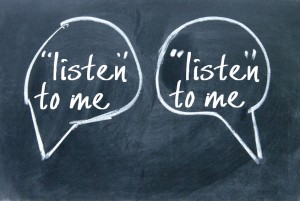Listening is key to personal effectiveness across the board – in our roles within both the business world and the multiple roles that we hold in our personal lives as partner, parent, child, friend. It is one of the 7 Habits of Highly Effective People (Stephen Covey) and it sets the foundation for the multitude of soft skills that employers seek, such as communication, teamwork and collaboration and problem solving, to name a few. The subject gets a lot of attention because both human nature and modern culture work against it. Here are three simple principals of good listening. By internalizing these key principals, and you can effectively build solid skills.
- It’s not about Me. To be an effective listener, you have to realize that, for this moment, the spotlight is not on you. Stop thinking about yourself and focus on the other party to the conversation. Sounds simple, but it is difficult to put into practice because human nature has us at the center of our universe. But if you can remember and truly own this concept, you don’t have to remember the various tips or blocks that will derail a conversation. Allow yourself to say – for the next 5 minutes (or 10 or 30), it’s not about me.
- Listening requires patience. Face it, in our fast paced world where we are constantly challenged to manage our calendar, having an effective conversation will require time and patience. So plan on it. Avoid scheduling or engaging in conversations when time will not allow for both sides to be heard. You may have a message to deliver, but add on time for the other party to speak and be heard. If you are thinking about what’s next on your calendar, you have failed in your role of a listener.
- Listening is not a passive skill. Listening is a highly active skill. Good listeners are alert, attentive and engaged. They listen with respect. They make an active choice to think before speaking. As a good listener, your role is to build upon what has been said and then contribute in a way that moves the conversation forward. Your contribution then will require the other person to talk (while you listen). To borrow from the rules of improv comedy: start with “Yes and…” rather than “No, but, or however….”
Your role as a Good Listener is to be a Partner. Resist the urge to impress or compete. Focus your attention. Engage and think before speaking. When speaking, build upon what has been said in order to move the conversation forward.








No comments yet.